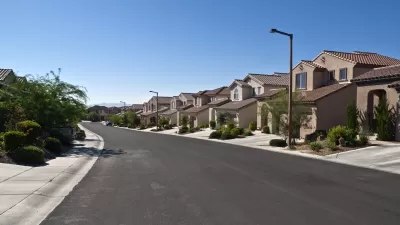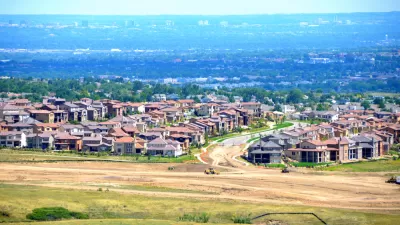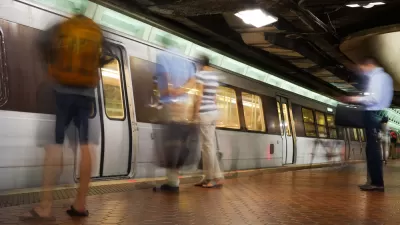The country cannot hope to achieve its goals for the reduction of greenhouse gas emissions without fundamentally rethinking its land use and development patterns, according to this article.

The Biden administration in April announced a bold target to reduce the country's greenhouse gas emissions by 50 percent from 2005 levels by the end of this decade. A recent report by researchers at the Brookings Institution argues that those targets won't be possible without systems-level changes in very sector of the economy, and unfortunately, the strategy announced by the Bien administration only skimmed over a "central driver of the climate crisis": unsustainable land use practices.
Adie Tomer, Joseph W. Kane, Jenny Schuetz, and Caroline George write to recenter land use in climate discussions, stating that the country won't achieve its goals to reduce greenhouse gas emissions by continuing to grow as it has in the past.
"After decades of sprawl, the U.S. has the dubious honor of being a world leader in both building-related energy consumption and vehicle miles traveled per capita. Making matters worse, lower-density development also pollutes our water and requires higher relative emissions during the initial construction," reads the article.
As a prescription for the consequences of the history of land use in the United States, the article proposes: "We must prioritize development in the kinds of neighborhoods that permanently reduce total driving and consume less energy."
"Such human-centered neighborhoods have the added benefit of helping us adapt to climate impacts, improve public health, and promote access to activities. Encouraging their development should be a central part of any national climate resilience strategy," continues the article.
Environmentalists have long connected sprawling development patterns to negative environmental outcomes like air pollution, but the connections between sprawl and the emissions that cause climate change tend to be underappreciated, or deliberately ignored, by even some of the most ardent environmentalists. The international community, led by the United Nations, has recently amplified the blame for climate change on the appetite in the United States for large, gas guzzling automobiles and sprawling development patterns.
FULL STORY: We can’t beat the climate crisis without rethinking land use

Study: Maui’s Plan to Convert Vacation Rentals to Long-Term Housing Could Cause Nearly $1 Billion Economic Loss
The plan would reduce visitor accommodation by 25,% resulting in 1,900 jobs lost.

North Texas Transit Leaders Tout Benefits of TOD for Growing Region
At a summit focused on transit-oriented development, policymakers discussed how North Texas’ expanded light rail system can serve as a tool for economic growth.

Alabama: Trump Terminates Settlements for Black Communities Harmed By Raw Sewage
Trump deemed the landmark civil rights agreement “illegal DEI and environmental justice policy.”

How Community Science Connects People, Parks, and Biodiversity
Community science engages people of all backgrounds in documenting local biodiversity, strengthening connections to nature, and contributing to global efforts like the City Nature Challenge to build a more inclusive and resilient future.

Alabama: Trump Terminates Settlements for Black Communities Harmed By Raw Sewage
Trump deemed the landmark civil rights agreement “illegal DEI and environmental justice policy.”

Dear Tesla Driver: “It’s not You, It’s Him.”
Amidst a booming bumper sticker industry, one writer offers solace to those asking, “Does this car make me look fascist?”
Urban Design for Planners 1: Software Tools
This six-course series explores essential urban design concepts using open source software and equips planners with the tools they need to participate fully in the urban design process.
Planning for Universal Design
Learn the tools for implementing Universal Design in planning regulations.
City of Santa Clarita
Ascent Environmental
Institute for Housing and Urban Development Studies (IHS)
City of Grandview
Harvard GSD Executive Education
Toledo-Lucas County Plan Commissions
Salt Lake City
NYU Wagner Graduate School of Public Service





























